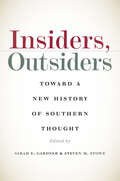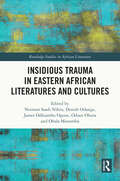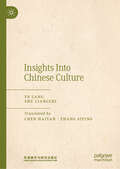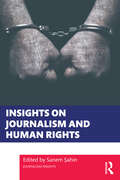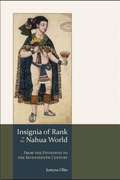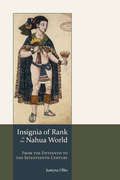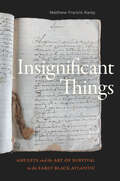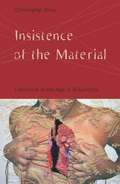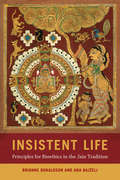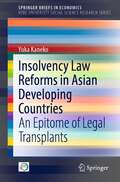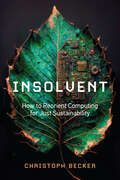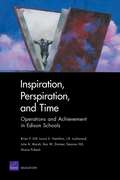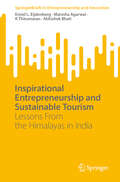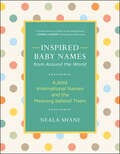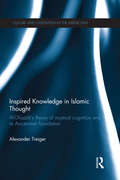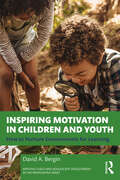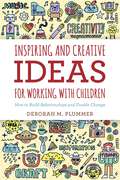- Table View
- List View
Insiders, Outsiders: Toward a New History of Southern Thought
by Sarah E. Gardner and Steven M. StoweThe history of thought and thinking in the American South is now alive with curiosity and poised for a new maturity. Thanks to the efforts of a growing variety of critics, the region is increasingly understood as a cultural habitat comprised of flows of ideas and sensibilities that originate both inside and outside traditional boundaries. This volume of essays uniquely combines perspectives from historians and literary scholars to explore a wide spectrum of thought about a region long understood as distinctive, yet often taken to represent "American" culture and character. Contributors first engage with how southern thinkers of all sorts have struggled with belonging--who is an insider and who is an outsider. Second, they consider how thought in the South has over time created ideas about the South. The volume capitalizes on an interdisciplinary synergy that has come to characterize southern studies, exploring current creative tensions between classic themes in southern history and the new ways to approach them. Region and identity, intellectuals and change, the South as an idea and ideas in the South—these continue to inspire the best new research as showcased in this collection. Contributors are Michael T. Bernath, Stephen Berry, John Grammer, Michael Kreyling, Scott Romine, Beth Barton Schweiger, Mitchell Snay, Melanie Benson Taylor, Jonathan Daniel Wells, and Timothy J. Williams.
Insidious Capital: Frontlines of Value at the End of a Global Cycle (Dislocations #35)
by Don KalbWith a team of anthropologists and geographers, Insidious Capital explores “value and values” in what may well be the last phase of capitalist globalization. In a global perspective of fast transforming social spaces that move from East to West, the book explores the struggles around the exploitation and valuation of labor, environmental politics, expansion of the ground rent, new hierarchies, the contradictions of higher education, the off shoring of “immaterial” labor, the illiberal right, and the mobilizations against it. This is a book about the variegated frontlines of value within an uneven, but not random, geography of capitalist expansion.
Insidious Trauma in Eastern African Literatures and Cultures (Routledge Studies in African Literature)
by Norman Saadi Nikro Oduor Obura Denish Odanga Obala Musumba James Odhiambo OgoneThis book investigates the thematic and conceptual dimensions of insidious trauma in contemporary eastern African literatures and cultural productions.The book extends our understanding of trauma beyond people’s immediate and conventional experiences of disastrous events and incidents, instead considering how trauma is sustained in the aftermaths, continuing to impact livelihoods, and familial, social, and gender relationships. Drawing on different circumstances and experiences across and between the eastern African region, the book explores how emerging cultural practices involve varying modes of narrating, representing, and thematising insidious trauma. In doing so, the book considers different forms and practices of cultural production, including fashion, social media, film, and literature, in order to uncover how human subjects and cultural artefacts circulate through modalities of social, cultural and political ecologies.Transdisciplinary in scope and showcasing the work of experts from across the region, this book will be an important guide for researchers across literature, media studies, sociology, and trauma studies.
Insights from the Risale-i Nur: Said Nursi's Advice for Modern Believers
by Thomas MichelThis collection of essays written by Thomas Michel offers an insightful and comparative analysis into the life, thoughts and major writings of Said Nursi. It provides insight into a deep conversation taking place between a Catholic priest and a Muslim theologian. This sincere and humble collection of essays will be an indispensable reading for believers of all faiths and backgrounds with an interest in social and contemporary issues. Michel remarks that Nursi called for unity and cooperation between the Muslim-Christian communities fifty years before the Vatican II called upon Christians and Muslims to recognize that they should move beyond the conflicts of the past and work together for the common good to build peace, establish social justice, defend moral values, and promote true human freedom.
Insights into Chinese Culture
by Ye Lang Zhu LiangzhiHighlighting the pinnacle achievements of Chinese culture, this book presents the authors’ profound insights into the concepts and passions that have shaped the Chinese nation over the past 5,000 years. By exploring this rich historical legacy of remarkable creativity and innovative spirit, still evident today in living masterpieces of art, architecture and fascinating folk traditions, readers will gain a deeper understanding of the cultural identity, worldview, aesthetic pursuits, and national spirit of the Chinese people.
Insights on Immersive Journalism (Journalism Insights)
by Ana Luisa Luisa Sánchez LawsBringing together theory and practice, this collection critically examines emerging conceptual, methodological and production frameworks for the study of immersive journalism. Having first begun in academia, the practice of virtual reality/360˚ video immersive journalism has seen a steep rise in the professional arena in recent years. Uniting contributions from scholars and practitioners at the cutting-edge of this vibrant field, this book provides a summary of the history, development and key debates in immersive journalism and considers issues such as conceptualising and researching immersive journalism, teaching and producing immersive journalism, and situating immersive journalism in a wider theoretical and ethical context. Each chapter introduces readers to the key terms and concepts in that area and provides study questions to help them engage with the text. Encouraging further enquiry and theorisation, and experimental design and production, Insights on Immersive Journalism is an invaluable resource for students and scholars interested in Immersive Journalism and Media.
Insights on Journalism and Human Rights (Journalism Insights)
by Sanem ŞahinBringing together 17 authors from diverse perspectives, Insights on Journalism and Human Rights offers an accessible introduction to the characteristics and complexities of reporting human rights issues in a changing media environment.Organised into three sections, this book begins by mapping the field of human rights and journalism, outlining the evolving interaction between journalists and the human rights movement, and summarising the main theories and debates surrounding this relationship. Chapters then focus on journalists who find themselves at the centre of human rights violations and explore the challenges they face when covering human rights abuses, including their own safety and responsibilities. The final section of the book scrutinises the media’s treatment of various human rights-related issues such as terrorism, missing people, climate change, and migration, and identifies weaknesses and gaps in their coverage.Featuring case studies, points for discussion, and further reading suggestions throughout, Insights on Journalism and Human Rights is recommended reading for advanced students, educators, and researchers in this field.
Insights on Literary Journalism (Journalism Insights)
by Kevin M. LernerBringing together ten chapters by some of the most important scholars of literary journalism around the world, this book covers a range of topics that are key to understanding the role of literary journalism as both a practice and a topic of academic study.Beginning with an introduction that situates literary journalism in its historical context, the chapters go on to address the basic definitional problem of literary journalism; the rhetorical strategies of literary journalists; the negotiated roles of subjects and storytellers; gender; geography; the role of literary journalism in fostering the public imagination; and the role of literary journalism in education. The chapters draw on contemporary and relatable case studies, which help readers link broader themes with their practical applications. This volume concludes with an Afterword by Bill Reynolds, editor of Literary Journalism Studies, which reflects on the preceding chapters and critically on the direction in which the field is heading in the near future.Insights on Literary Journalism is highly recommended reading for advanced scholars and researchers of Literary Journalism as well as Literature and Media History.
Insights on Science Journalism (Journalism Insights)
by Felicity MellorBringing together experts from a range of disciplines, this collection critically examines science journalism, paying special attention to the points of tension that science journalists navigate in their work today.Faced with the twin crises of climate change and a global pandemic, science journalism has never before been so prominent. This book showcases perspectives that transcend the particulars of the specific news events and outlets studied, in order to provide an overview of the key areas of scholarly interest regarding the nature of science journalism. The volume is organised into three sections: the first provides historical case studies illustrating the demarcation of science journalism from science as science journalism emerged as a recognisable news beat in the twentieth century; the second examines the relationship between science journalists and their sources, particularly scientists, and the mediation of this relationship through organisations, foreign journalism and political constraints; and the final section considers the style and voice of science journalism content. Case studies and original empirical research are compiled from across the globe, including the UK, US, Germany, Vietnam, and Russia, and are synthesised to offer a readable and engaging insight into the beat.Insights on Science Journalism is recommended reading for advanced students and researchers of science journalism and communication and will also appeal to those working in the fields of science and technology studies and risk communication.
Insignia of Rank in the Nahua World
by Justvna OlkoIn this significant work, Olko reconstructs the repertory of insignia of rank and the contexts and symbolic meanings of their use, along with their original terminology, among the Nahuatl-speaking communities of Mesoamerica from the fifteenth through the seventeenth centuries. In this interpretive study and handy reference, Olko engages with and builds upon extensive worldwide scholarship and skillfully illuminates this complex topic, creating a vital contribution to the fields of pre-Columbian and colonial Mexican studies. Insignia of Rank in the Nahua World substantially expands and elaborates the themes of Olko's Turquoise Diadems and Staffs of Office: Elite Costume and Insignia of Power in Aztec and Early Colonial Mexico, originally published in Poland and never released in North America.
Insignia of Rank in the Nahua World: From the Fifteenth to the Seventeenth Century
by Justyna OlkoThis significant work reconstructs the repertory of insignia of rank and the contexts and symbolic meanings of their use, along with their original terminology, among the Nahuatl-speaking communities of Mesoamerica from the fifteenth through the seventeenth centuries. Attributes of rank carried profound symbolic meaning, encoding subtle messages about political and social status, ethnic and gender identity, regional origin, individual and community history, and claims to privilege. Olko engages with and builds upon extensive worldwide scholarship and skillfully illuminates this complex topic, creating a vital contribution to the fields of pre-Columbian and colonial Mexican studies. It is the first book to integrate pre- and post-contact perspectives, uniting concepts and epochs usually studied separately. A wealth of illustrations accompanies the contextual analysis and provides essential depth to this critical work. Insignia of Rank in the Nahua World substantially expands and elaborates on the themes of Olko's Turquoise Diadems and Staffs of Office, originally published in Poland and never released in North America.
Insignificant Things: Amulets and the Art of Survival in the Early Black Atlantic (The Visual Arts of Africa and its Diasporas)
by Matthew Francis RareyIn Insignificant Things Matthew Francis Rarey traces the history of the African-associated amulets that enslaved and other marginalized people carried as tools of survival in the Black Atlantic world from the seventeenth to the nineteenth centuries. Often considered visually benign by white Europeans, these amulet pouches, commonly known as “mandingas,” were used across Africa, Brazil, and Portugal and contained myriad objects, from herbs and Islamic prayers to shells and coins. Drawing on Arabic-language narratives from the West African Sahel, the archives of the Portuguese Inquisition, sixteenth- and seventeenth-century European travel and merchant accounts of the West African Coast, and early nineteenth-century Brazilian police records, Rarey shows how mandingas functioned as portable archives of their makers’ experiences of enslavement, displacement, and diaspora. He presents them as examples of the visual culture of enslavement and critical to conceptualizing Black Atlantic art history. Ultimately, Rarey looks to the archives of transatlantic slavery, which were meant to erase Black life, for objects like the mandingas that were created to protect it.
Insist That They Love You: Craig Rodwell and the Fight for Gay Pride
by John Van HoesenSet against the vibrant backdrop of New York and Chicago, Insist That They Love You presents a comprehensive biography of Craig Rodwell, an unheralded yet pivotal figure in the militant gay rights movement of the 1960s and 1970s.Award-winning journalist John Van Hoesen explores cities grappling with social change, while highlighting Craig Rodwell’s transformative impact. The book traces Rodwell’s journey from a complicated childhood in a Christian Science boarding school and turbulent teenage years to his prominent role as an activist in adulthood. Founder of the first bookstore of its kind dedicated to gay and lesbian literature – the Oscar Wilde Memorial Bookshop – Rodwell played a crucial role in the early protests for gay rights, the Stonewall Riots, and the inaugural pride march of 1970. The book also thoughtfully considers the trajectory of Rodwell’s tumultuous personal life, including his relationship with Harvey Milk. Insist That They Love You honours Rodwell’s vital contributions to the gay rights movement, bringing to life for readers the fearless determination and hard work that built today’s freedoms. This compelling biography inspires readers to reflect on the power of truth, courage, and action to further social change.
Insistence of the Material: Literature in the Age of Biopolitics
by Christopher BreuInsistence of the Material engages with recent theories of materiality and biopolitics to provide a radical reinterpretation of experimental fiction in the second half of the twentieth century. In contrast to readings that emphasize the metafictional qualities of these works, Christopher Breu examines this literature&’s focus on the material conditions of everyday life, from the body to built environments, and from ecosystems to economic production. In Insistence of the Material, Breu rethinks contemporary understandings of biopolitics, affirming the importance of forms of materiality that refuse full socialization and resist symbolic manipulation. Breu considers a range of novels that reflect questions of materiality in a biopolitical era, including William Burroughs&’s Naked Lunch, Thomas Pynchon&’s V., J. G. Ballard&’s Crash, Dodie Bellamy&’s The Letters of Mina Harker, and Leslie Marmon Silko&’s Almanac of the Dead. Drawing from accounts of the emergence of immaterial production and biopolitics by Michel Foucault, Giorgio Agamben, Roberto Esposito, and Michael Hardt and Antonio Negri, Breu reveals the confrontational dimensions of materiality itself in a world devoted to the idea of its easy malleability and transcendence.Taking his analysis beyond the boundaries of literature, Breu argues that both materiality and subjectivity form sites of resistance to biopolitical control and that new developments in materialist theory advance a conception of social existence in which materiality—rather than language or culture—is the central term.
Insistent Life: Principles for Bioethics in the Jain Tradition
by Brianne Donaldson Ana BajželjA free open access ebook is available upon publication. Learn more at www.luminosoa.org. Jainism, perhaps more so than any other South Asian tradition, focuses strongly on the ethics of birth, life, and death, with regard to both humans and other living beings. Insistent Life is the first full-length interdisciplinary examination of the foundational principles of bioethics within Jain doctrine and the application of those principles in the contemporary sphere. Brianne Donaldson and Ana Bajželj analyze a diverse range of Jain texts and contemporary sources to identify Jain perspectives on bioethical issues while highlighting the complexity of their personal, professional, and public dimensions. The book also features extensive original data based on an international survey the authors conducted with Jain medical professionals in India and diaspora communities of North America, Europe, and Africa.
Insolvency Law Reforms in Asian Developing Countries: An Epitome of Legal Transplants (SpringerBriefs in Economics)
by Yuka KanekoThis book examines the outcomes of the economic law reforms in Asian developing countries, guided by the leading international development financiers such as the World Bank and the Asian Development Bank. Included is a particular focus on the recent “insolvency law” reforms in the Asian emerging economies, such as Vietnam, Laos, and Myanmar. Such legal reforms are the results of the “transplant” of the model law provided by these donor agencies, a law that was created in the post-Asian Currency Crisis in the 1990s. This book therefore examines the outcomes of three decades of donor-guided legal reforms. Appropriately, it applies not only the static approach to the legal texts but also an empirical methodology through interview surveys of the corporate and financial sectors. Following the introduction in Chapter I, Chapter II reviews the basic theories and presents the methodological framework. Chapter III then analyzes the contents of insolvency law reforms in the major target countries, namely, Vietnam, Laos, and Myanmar. Chapter IV provides a closer investigation into the design choices of Myanmar’s 2020 Insolvency Law as a typical example of the law reform involving the inter-donor conflict of law models between the Asian Development Bank and Japan’s official development assistance project. Lastly, Chapter V applies an empirical approach to the functioning of insolvency law, through international collaboration for interview surveys with small and medium-sized enterprises (SMEs) and their financiers.
Insolvent: How to Reorient Computing for Just Sustainability
by Christoph BeckerHow we can enact meaningful change in computing to meet the urgent need for sustainability and justice.The deep entanglement of information technology with our societies has raised hope for a transition to more sustainable and just communities—those that phase out fossil fuels, distribute public goods fairly, allow free access to information, and waste less. In principle, computing should be able to help. But in practice, we live in a world in which opaque algorithms steer us toward misinformation and unsustainable consumerism. Insolvent shows why computing&’s dominant frame of thinking is conceptually insufficient to address our current challenges, and why computing continues to incur societal debts it cannot pay back. Christoph Becker shows how we can reorient design perspectives in computer science to better align with the values of sustainability and justice.Becker positions the role of information technology and computing in environmental sustainability, social justice, and the intersection of the two, and explains why designing IT for just sustainability is both technically and ethically challenging . Becker goes on to argue that computing could be aided by critical friends—disciplines that draw on critical social theory, feminist thought, and systems thinking—to make better sense of its role in society. Finally, Becker demonstrates that it is possible to fuse critical perspectives with work in computer science, showing new and fruitful directions for computing professionals and researchers to pursue.
Inspiration, Perspiration, and Time
by Brian Gill Ron Zimmer Laura S. Hamilton Julie A. Marsh J. R. LockwoodIn 2000, Edison Schools, the nation's largest education management organization, asked RAND to analyze its achievement outcomes and design implementation. RAND evaluated Edison's strategies for promoting student achievement in its schools, how it implemented those strategies, how its management affected student achievement, and what factors explained differences in achievement trends among its schools.
Inspirational Entrepreneurship and Stimulating Tourism: Lessons From the Himalayas in India (SpringerBriefs in Entrepreneurship and Innovation)
by Emiel L. Eijdenberg Abhishek Bhati K Thirumaran Manisha AgarwalThis book explores inspirational entrepreneurial activities in the tourism industry of Ladakh, India. It particularly looks at ways to develop an entrepreneurial yet environment-friendly tourist destination. The book starts off with in-depth historical reflections of entrepreneurship and tourism in one of India&’s fastest growing tourist destinations. Subsequently, the book studies the unique entrepreneurial challenges and opportunities in Ladakh&’s extreme resource-scarcity and remote context based on empirical evidence from entrepreneurs and stakeholders in the tourism industry. In addition, a broad overview of contemporary entrepreneurial activities in the tourism industry in Ladakh is presented, underscoring the importance of indigenous knowledge and cultural traditions for developing sustainable tourism. Based on qualitative data analyses and literature reflections, this book provides scholars, students, professionals and policymakers an alternative view on entrepreneurial activities in the tourism industry of an ecologically jeopardized region.
Inspired Baby Names from Around the World: 6,000 International Names and the Meaning Behind Them
by Neala ShaneThousands of Names and the Blessings They Can Impart This unique guide includes 6,000-plus names from all corners of the globe, and each entry illuminates the name’s distinctive spiritual, historical, and cultural background — its poetry. Names, from the traditional to the newly coined, are fully explained. Pronunciation guide, origin, alternate spellings, and meaning are enhanced by the affirmation carefully chosen for each name. Lists of names by meaning, names by ethnicity, and most popular names by decade provide easy reference. Whether your aim is to honor ancestors, capture a child’s essence, or convey parental hopes, Inspired Baby Names from Around the World will help you greet and bless your new baby with heartfelt meaning.
Inspired Finance
by Michael LooftInspired Finance argues that much of the world's poor need access to financial services through vehicles such as microfinance rather than a continued reliance on charity. It demonstrates how modern microfinance traces its roots to various religious traditions, exploring the tension between charity and self-reliance in those traditions. Through thoughtful investigation and engaging case studies, Inspired Finance examines the impact these historical religious legacies have had on designing and developing financial services for the poor. Ultimately, Inspired Finance challenges you to consider how these religious influences can be restructured to help a rapidly growing industry target the poor in a way that truly helps them rise out of poverty, while at the same time respecting their inherent worth and dignity.
Inspired Knowledge in Islamic Thought: Al-Ghazali's Theory of Mystical Cognition and Its Avicennian Foundation (Culture and Civilization in the Middle East)
by Alexander TreigerIt has been customary to see the Muslim theologian Abu Hamid al-Ghazali (d. 1111) as a vehement critic of philosophy, who rejected it in favour of Islamic mysticism (Sufism), a view which has come under increased scrutiny in recent years. This book argues that al-Ghazali was, instead, one of the greatest popularisers of philosophy in medieval Islam. The author supplies new evidence showing that al-Ghazali was indebted to philosophy in his theory of mystical cognition and his eschatology, and that, moreover, in these two areas he accepted even those philosophical teachings which he ostensibly criticized. Through careful translation into English and detailed discussion of more than 80 key passages (with many more surveyed throughout the book), the author shows how al-Ghazali’s understanding of "mystical cognition" is patterned after the philosophyof Avicenna (d. 1037). Arguing that despite overt criticism, al-Ghazali never rejected Avicennian philosophy and that his mysticism itself is grounded in Avicenna’s teachings, the book offers a clear and systematic presentation of al-Ghazali’s "philosophical mysticism." Challenging popular assumptions about one of the greatest Muslim theologians of all time, this is an important reference for scholars and laymen interested in Islamic theology and in the relations between philosophy and mysticism.
Inspired and Outraged: The Making of a Feminist Physician
by Alice RothchildA remarkable autobiography of Alice Rothchild's journey from 1950's good girl to irreverent, feisty, feminist obstetrician-gynecologist forging her own direction in the contradictory, sexist world of medicineA remarkable autobiography—written entirely in free verse—of Alice Rothchild's journey from 1950's good girl to irreverent, feisty, feminist obstetrician-gynecologist forging her own direction in the contradictory, sexist world of medicine. As a child who came of age in the turbulent 1960s, she was compelled to create a path in the often outrageous, male-dominated medical field, repeatedly finding herself to be a first: accepted into an ob-gyn residency, opening an all-woman practice, working with midwives, challenging the status quo, shaped by her early involvement with Our Bodies Ourselves. Rothchild's poems are steeped in the often-shocking history of medicine and the conflicted sexual politics of the second half of the twentieth century.
Inspiring Motivation in Children and Youth: How to Nurture Environments for Learning (Applying Child and Adolescent Development in the Professions Series)
by David A. BerginInspiring Motivation in Children and Youth: How to Nurture Environments for Learning explores motivation and its crucial role in promoting well-being in the classroom and life beyond school. It will help all those who work with children and youth to understand and improve their motivation, and to create nurturing environments for younger people. David Bergin provides a highly accessible exploration of key research, examining the ways children’s goals, self-efficacy, self-determination, and feelings of being cared for affects their motivation as well as their desire to learn more about themselves and the world. This essential guide also addresses influences of competition, diversity, prejudice, and discrimination on motivation. The book provides a comprehensive look at the importance of instilling motivation at this critical age, highlighting the benefits through real-life examples and anecdotes. Illustrated with stories from diverse contexts, the author provides practical advice on how to use goals effectively, help children feel competent, autonomous, and like they belong. Inspiring Motivation in Children and Youth is for any student looking to excel in a psychological, educational, health, or social work setting, as well as professionals in the field, and parents. It is targeted for people who work or plan to work with children from pre-school to high school and will be useful to teachers, youth leaders, coaches, counselors, social workers, and nurses.
Inspiring and Creative Ideas for Working with Children: How to Build Relationships and Enable Change
by Deborah PlummerEmploying a range of innovative and creative ideas, this book is full of tips to engage children and promote their wellbeing. Children are vulnerable to low self-esteem, stress and anxiety because they are still growing and learning. This book looks at what we can do to minimise children's vulnerability to issues such as these, help them to build emotional resilience and teach them effective strategies for dealing with life's ups and downs. The book offers a host of different approaches that adults can use with children, including image-making, storytelling and puppetry. Chapters are brought to life with the voices of parents and professionals describing how these techniques worked for them. They also include guidance on how the principles can be used by professionals in the home, in schools or in therapeutic settings.
